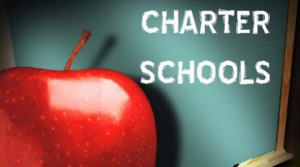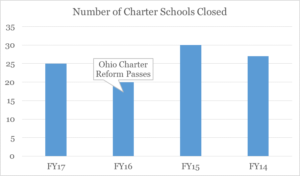What you need to know about Ohio Politics and Policy
Stephen Dyer · November 30, 2017
Want to be a Highly Rated Ohio Charter School Authorizer? Here’s How.
 When the Ohio General Assembly passed historic Charter School Reform in 2015, the state’s new Charter School Sponsor accountability system was touted as a key to improving Ohio’s nationally ridiculed charter school funding system.
The idea was if sponsors (authorizers in any other state) had to actually ensure their schools were effectively educating students, then the sponsors would drop poor performing schools, cleaning the market of Ohio’s worst performing charter schools.
But that hasn’t exactly happened. There are fewer charter schools operating today than when the legislation was passed, but that has been primarily because new schools haven’t opened at nearly the pre-reform rates, which would typically make up for the closed schools.
When the Ohio General Assembly passed historic Charter School Reform in 2015, the state’s new Charter School Sponsor accountability system was touted as a key to improving Ohio’s nationally ridiculed charter school funding system.
The idea was if sponsors (authorizers in any other state) had to actually ensure their schools were effectively educating students, then the sponsors would drop poor performing schools, cleaning the market of Ohio’s worst performing charter schools.
But that hasn’t exactly happened. There are fewer charter schools operating today than when the legislation was passed, but that has been primarily because new schools haven’t opened at nearly the pre-reform rates, which would typically make up for the closed schools.
 As you can see, in the two full school years after Ohio’s charter reform legislation, fewer charter schools have closed than in the two years prior to the legislation. While the closures tend to be more high-profile given the media’s heightened sensitivity to charter schools, closures are slightly down since the legislation passed.
Why is this, given the law’s clear intent to force sponsors to be more vigilant over their schools’ performance?
Well, it’s because the charter sponsor evaluation system is deeply flawed, vastly overrating a sponsor’s ability to fill out paperwork over a sponsor’s ability to ensure students are learning at their schools.
In addition, sponsors have realized that if they are able to sponsor more dropout recovery schools, whose accountability system is notoriously lax, they’ll be able to hide their regular schools’ mostly poor academic performance.
Overall, dropout recovery schools rate about twice as high on their academic ratings as regular charter schools. In addition, their weighted ratings (which accounts for how many students attend the schools and are aggregated for a sponsor’s overall academic rating) are about 10 times higher than a typical Ohio charter school — still very low, but not quite as low.
This despite the fact the average dropout recovery school doesn’t graduate even 1 out of 4 of its students on time.
So these things are like gold to a charter school sponsor. And if you don’t have any in your portfolio, you’re behind the eight-ball.
Of the nine Ohio charter school sponsors that had zero dropout recovery schools under their purview last school year, five were rated ineffective or poor, meaning they could be forced as early as next school year to give up sponsoring charter schools.
This dovetails with the incongruity of a sponsor like Scioto County Career Technical Center, which is one of only eight sponsors to earn an A academic grade, being rated as one of the state’s worst charter school sponsors because it didn’t meet the state’s bureaucratic requirements. Their Poor rating means that one of the state’s highest performing academic charter sponsors would not be allowed to sponsor schools next school year, assuming they lose any appeals.
This result was not what the sponsor evaluation system was supposed to accomplish.
The state needs to fix this flawed system, weighting sponsors’ academic performance more heavily than its bureaucratic components. Instead of all three counting the same, I would like to see academics count as one-half of the grade with the other two counting 25 percent each. That’s better than the current system only counting academics as one-third of a sponsor’s grade.
It should also be impossible to be rated an effective sponsor unless your academic component is at least a C. Nor should you be rated ineffective if your academic rating is a B or A.
What should matter to policymakers is what the children who attend schools under these sponsors’ aegis are learning, not how well the sponsors’ adults fill out forms.
Though I could be wrong.
As you can see, in the two full school years after Ohio’s charter reform legislation, fewer charter schools have closed than in the two years prior to the legislation. While the closures tend to be more high-profile given the media’s heightened sensitivity to charter schools, closures are slightly down since the legislation passed.
Why is this, given the law’s clear intent to force sponsors to be more vigilant over their schools’ performance?
Well, it’s because the charter sponsor evaluation system is deeply flawed, vastly overrating a sponsor’s ability to fill out paperwork over a sponsor’s ability to ensure students are learning at their schools.
In addition, sponsors have realized that if they are able to sponsor more dropout recovery schools, whose accountability system is notoriously lax, they’ll be able to hide their regular schools’ mostly poor academic performance.
Overall, dropout recovery schools rate about twice as high on their academic ratings as regular charter schools. In addition, their weighted ratings (which accounts for how many students attend the schools and are aggregated for a sponsor’s overall academic rating) are about 10 times higher than a typical Ohio charter school — still very low, but not quite as low.
This despite the fact the average dropout recovery school doesn’t graduate even 1 out of 4 of its students on time.
So these things are like gold to a charter school sponsor. And if you don’t have any in your portfolio, you’re behind the eight-ball.
Of the nine Ohio charter school sponsors that had zero dropout recovery schools under their purview last school year, five were rated ineffective or poor, meaning they could be forced as early as next school year to give up sponsoring charter schools.
This dovetails with the incongruity of a sponsor like Scioto County Career Technical Center, which is one of only eight sponsors to earn an A academic grade, being rated as one of the state’s worst charter school sponsors because it didn’t meet the state’s bureaucratic requirements. Their Poor rating means that one of the state’s highest performing academic charter sponsors would not be allowed to sponsor schools next school year, assuming they lose any appeals.
This result was not what the sponsor evaluation system was supposed to accomplish.
The state needs to fix this flawed system, weighting sponsors’ academic performance more heavily than its bureaucratic components. Instead of all three counting the same, I would like to see academics count as one-half of the grade with the other two counting 25 percent each. That’s better than the current system only counting academics as one-third of a sponsor’s grade.
It should also be impossible to be rated an effective sponsor unless your academic component is at least a C. Nor should you be rated ineffective if your academic rating is a B or A.
What should matter to policymakers is what the children who attend schools under these sponsors’ aegis are learning, not how well the sponsors’ adults fill out forms.
Though I could be wrong.
Tagged in these Policy Areas: K-12 Education


